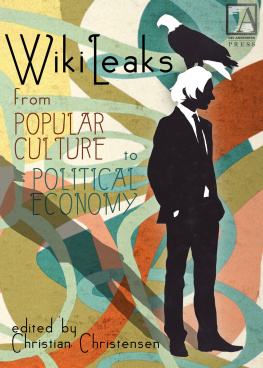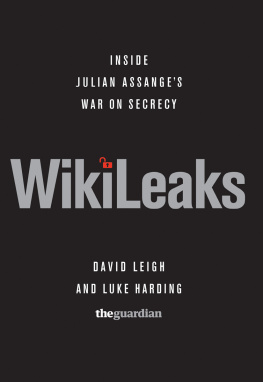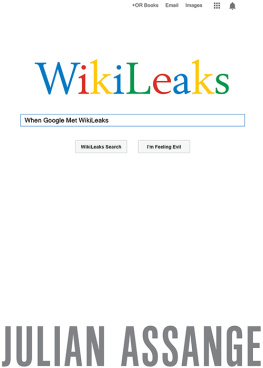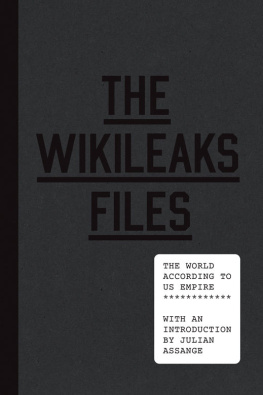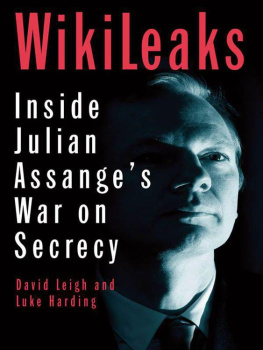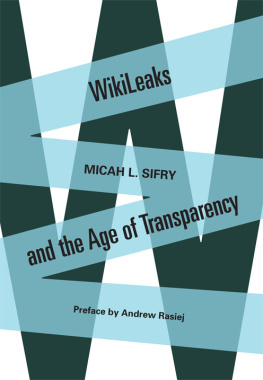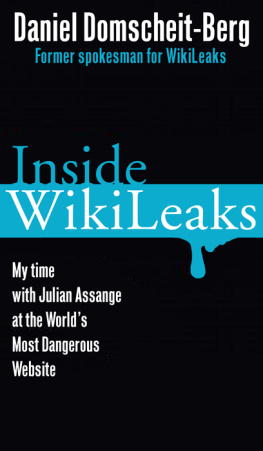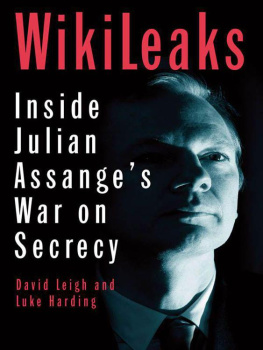Table of Contents
Guide


The articles from this collection previously appeared as a Special Section of the International Journal of Communication (http://ijoc.org), a publication of the USC Annenberg Press, University of Southern California. The Special Section can be accessed at http://ijoc.org/index.php/ijoc/article/view/3210/1248.

ISBN Ebook: 9781625176349
USC Annenberg Press is committed to excellence in communication scholarship, journalism, media research, and application. To advance this goal, we edit and publish prominent scholarly publications that are both innovative and influential, and that chart new courses in their respective fields of study. Annenberg Press has extended its publishing arm that now includes e-books as a new cutting-edge forum featuring the work of both established and emerging scholars.
Larry Gross, Editor
Arlene Luck, Managing Editor

2014 USC Annenberg Press. Published under Creative Commons Non-Commercial No Derivatives (by-nc-nd) license.
WikiLeaks:
From Popular Culture to
Political Economy
WikiLeaks:
From Popular Culture to
Political Economy
CHRISTIAN CHRISTENSEN
Stockholm University, Sweden
Within a relatively short period of time, WikiLeaks became the best-known whistle-blowing organization in the world. Due in part to the release of massive quantities of classified data on the occupations of Afghanistan and Iraq, the notoriety of its founder, Julian Assange, and the trial and imprisonment of Chelsea Manning, WikiLeaks has been the subject of widespread attention and debate. The evolution of WikiLeaks since its foundation in 2006 can be seen in three distinct phases: (1) as an alternative to the mainstream media (from 20062009); (2) as adapting to the mainstream via collaboration (20092011), and (3), as abstaining from and/or attacking the mainstream (2011-present) (Christensen, 2015). While the events from the latter two stages are the most well-knownprimarily the release of the Collateral Murder video, the Iraq and Afghanistan war documents, and the diplomatic cables (WikiLeaks, 2010a, 2010b, 2010c, 2010d)the material leaked by WikiLeaks during their early years was also impressive. Between 20082010, for example, WikiLeaks released documents showing potential money laundering by the major Swiss bank Julius Baer (WikiLeaks, 2008a), potential policy-making corruption within of the World Health Organization (WikiLeaks, 2008b), illegal dumping of toxic waste off of the Ivory Coast (WikiLeaks, 2009a), membership lists of the far-right British National Party (WikiLeaks 2009b), and arm-twisting by the U.S. government during the Copenhagen UN Climate Change Conference (Carrington, 2010).
Despite their early work, it was the leaked material that came from Chelsea Manning that threw WikiLeaks into the international spotlight, and, thus, made the organization a topic of scholarly interest. To date, the most in-depth single work on WikiLeaks has come from Brevini, Hintz, and McCurdy (2013), but a number of other scholars have investigated the relationship between the organization and, for example, journalism (e.g., Coddington, 2012; Handley & Rutigliano, 2012; Lynch, 2010, 2013; McNair, 2012; Tambini, 2013), law (e.g., Benkler, 2012; Cannon 2013; Davidson 2011; Fenster 2012; Peters 2011; Rothe & Steinmetz 2013; Wells 2012), and resistance and activism (e.g., Cammaerts, 2013; Lindgren & Lundstrm, 2011; Zajcz, 2013). The idea behind this collection of essays about WikiLeaks was influenced by the fact that WikiLeaks, their activities, and the sociopolitical incrustations around the organization resonate in so many areas within media studies and related disciplinesmore, I would argue, than have been addressed to date. Thus, when I began to approach authors regarding potential contributions to this collection, I was interested in asking influential and innovative scholars from a wide variety of research backgrounds.
In addition to widening the scope of scholarly discussion on WikiLeaks, two more observations motivated my putting this special section together. First, scholarship and writing addressing topical, technology-related material can, unfortunately, lose resonance in a relatively short period of time. This is not so much a critique of the modus operandi of academic publishing and its output (which requires more time and review than popular publications) as it is an observation about the rapidly changing research environment within which we work. With this in mind, I wanted contributors to consider WikiLeaks and WikiLeaks-related issues within the big picture of media studies: to speculate about the impact, relevance, and/or importance of the organization over the long-term. The goal was to discuss the particularities of the WikiLeaks phenomenon, of course, but also to link those particularities to broader issues of intellectual inquiry. The (admittedly ambitious) idea was to produce a series of essays that would maintain salience over time and not just act as a source of new information about WikiLeaks that would quickly date. Second, WikiLeaks is a provocative topic. When I first considered putting together this collection, I realized that a fruitful format for discussing WikiLeaks might be to invite scholars to submit their ideas in essay form and to encourage them to speculate about why WikiLeaks does (or does not) matter. I wanted them to be rigorous in their arguments, but also to proffer opinions and even speculation about WikiLeaks in relation to our academic field. I hope as readers look through the essays in this collection they will notice that the contributors have managed to be concrete and precise in their thinking, but also provocative and sharp in their argumentation.
With these issues in mind, this special section on WikiLeaks begins with an interview by Christian Christensen with the Icelandic MP, activist, and former WikiLeaks volunteer Birgitta Jnsdttir (WikiLeaks, Transparency, and Privacy: A Discussion with Birgitta Jonsdottir). As a former volunteer and key member of the group that worked on significant portions of the material obtained from Chelsea Manning, Jnsdttir is in a unique position to discuss the work of the organization, the impact it has had on her life, and the relationship between transparency and politics.
The interview with Jnsdttir is followed by 14 essays in three general thematic areas: WikiLeaks in relation to storytelling and journalism; WikiLeaks and information policy, surveillance, and information storage/archiving; and WikiLeaks and political activism, freedom of speech, and the political economy of media. The first section, titled Narrative and Truth, contains essays by William Uricchio (True Confessions: WikiLeaks, Contested Truths, and Narrative Containment), Toby Miller (WikiLeaks, the State, and Middle-Aged Media), Karin Wahl-Jorgensen (Is WikiLeaks Challenging the Paradigm of Journalism? Boundary Work and Beyond), and Christian Christensen (WikiLeaks and the Afterlife of Collateral Murder).
The second section, Information and Surveillance, features essays by Sandra Braman (We Are Bradley Manning: Information Policy, the Legal Subject, and the WikiLeaks Complex),

